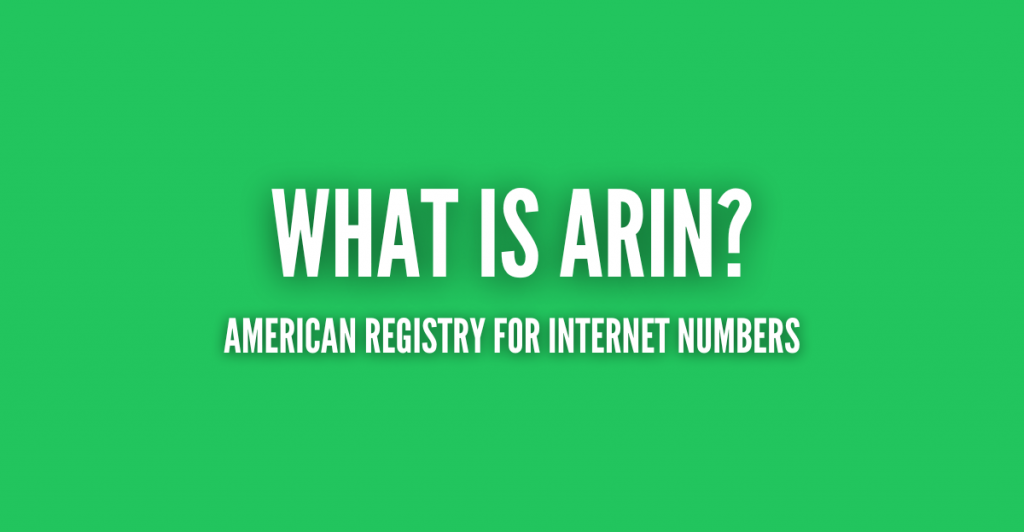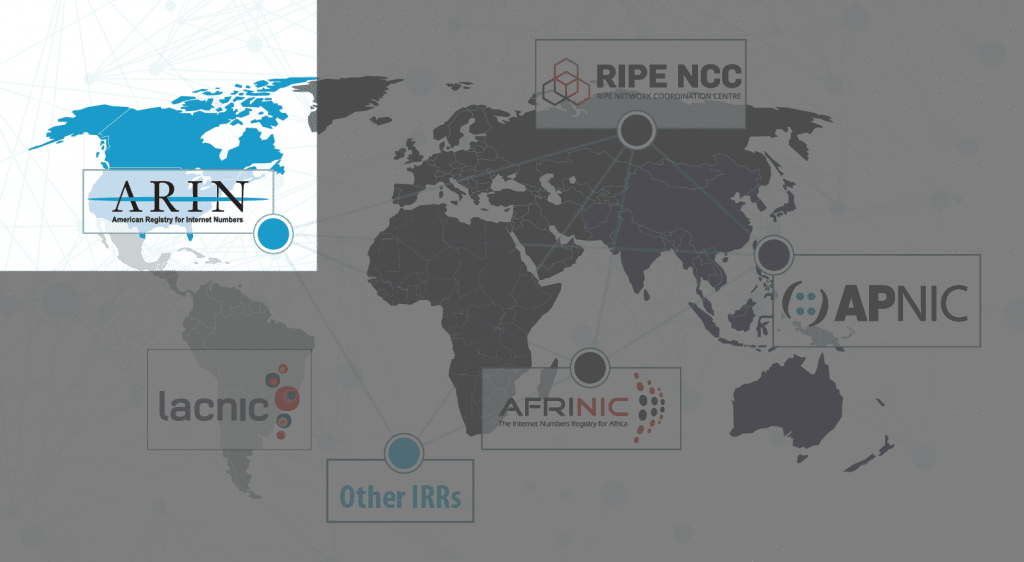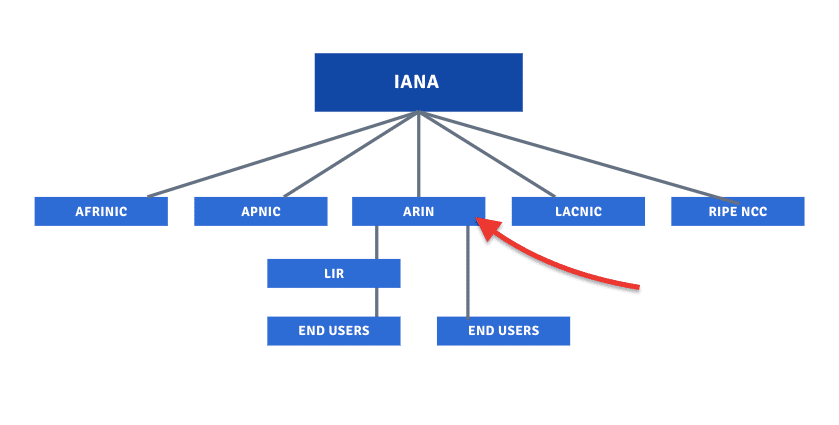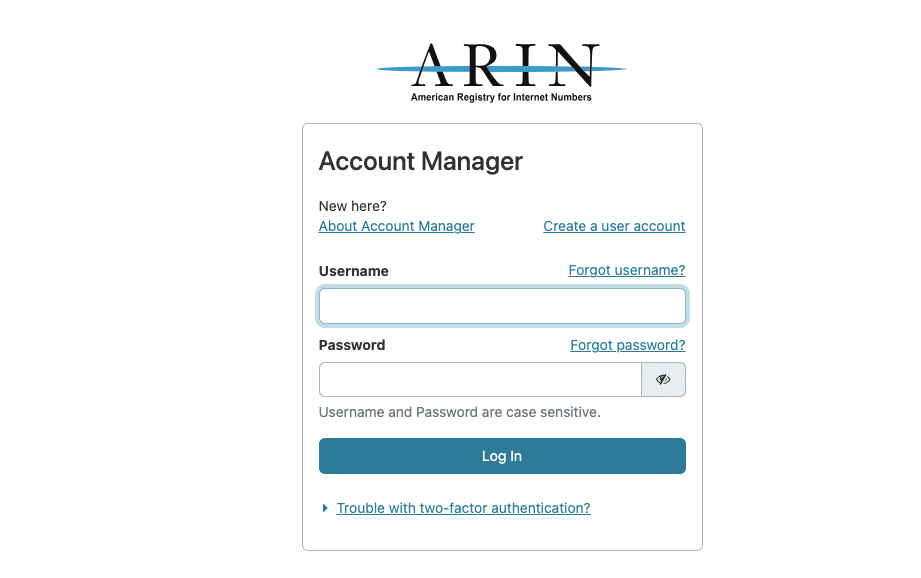ARIN, the American Registry for Internet Numbers, plays a vital role in the allocation and management of Internet resources in North America.
In this comprehensive guide, we will explore what ARIN is, its functions, policies, and its impact on the internet.

Table of Contents.
- What is ARIN, its roles, and its services?
- What are ARIN’s policies?
- Security and ARIN.
- How to interact with ARIN?
- Final words.
1. What is ARIN, its roles and services?
ARIN, (the American Registry for Internet Numbers,) is one of the five Regional Internet Registries (RIRs) worldwide. It is primarily responsible for the allocation and management of Internet Protocol (IP) addresses and Autonomous System Numbers (ASNs) in North America. It particularly serves the United States, Canada, and several Caribbean and North Atlantic islands.
Other RIRs like RIPE NCC, LACNIC, AFRINIC, and APNIC serve the same purpose but for other parts of the world.

What is ARIN’s role?
ARIN is like the big boss of IP addresses in North America. It allocates IP addresses mainly to LIR (Local Internet Registries) but can also provide to end-users like ISPs, organizations, businesses, and everyone else. It ensures everyone (within North America) gets their fair share of IPs. This allocation process encompasses both IPv4 and IPv6 addresses and is executed meticulously to ensure efficient utilization while also protecting against address exhaustion.

ARIN is also in charge of assigning Autonomous System Numbers (ASNs), which are like the road signs for internet traffic. This helps to keep the internet running smoothly and efficiently.
ARIN is always working to improve things, and they welcome feedback from the community. They’re a pretty important organization, and they play a vital role in keeping the internet running.
What services does ARIN offer?
Aside from allocating and managing IP resources in North America, ARIN offers a variety of services to support its mission and help its stakeholders:
a. Whois Database: ARIN offers a publicly accessible Whois database, which lets you look up important details about IP address allocations. This database is really useful for network administrators and researchers because it provides essential information that can help them manage and analyze internet resources within ARIN’s jurisdiction.
b. Resource Request: Organizations and Internet Service Providers (ISPs) can request IP address allocations or transfers through ARIN’s user-friendly online portal. ARIN takes its job seriously. They review each request carefully, following strict policies and criteria to make sure that IP resources are distributed fairly, equitably, and efficiently.
c. Policy Development: ARIN is always looking for ways to get people involved in the community and ensure everyone has a say in how things are run. They do this by holding regular meetings and discussions where people can come together to discuss policy changes. This way, everyone has a chance to contribute and make sure that the policies reflect the needs of the community.
d. Outreach and Education: ARIN is dedicated to good internet governance. They’re always working hard to raise awareness about IP address management. They do this through outreach and educational initiatives, like workshops, webinars, and documentation.
2. What are ARIN Policies?
ARIN’s policies are key for making sure that the internet works well for everyone in North America. They cover a lot, like how IP addresses are assigned, how IPv6 is adopted, and how resources are used efficiently. By making sure all of this stuff is taken care of, ARIN helps to keep the internet running smoothly and growing.
Here are some of the most important ARIN policies to consider.
a. IPv6 Adoption Policy.
ARIN is on a mission to get everyone on IPv6, which is the next generation of internet addressing. IPv4 addresses are running out, so IPv6 is the only way to keep the internet going strong. One thing that many people don’t know is that ARIN offers incentives and support to help organizations make the switch to IPv6. IPv6 migration is imminent, fortunately, there are best practices and tips to migrate smoothly.
b. IP Address Transfers.
ARIN’s policies are super important for governing IP address transfers. They lay out the specific rules for when and how IP addresses can be transferred. These rules are designed to make sure that IP addresses are transferred fairly and transparently. These policies help keep the internet stable and secure by providing guidelines for how IP addresses should be used.
Note: It is important to add here that IP address transfers can happen both within the ARIN region and between different regions (such as RIPE NCC, LACNIC, AFRINIC and APNIC).
c. Resource Utilization.
ARIN has rules to determine whether organizations are using their IP addresses well. This is important so that IP addresses aren’t wasted. ARIN checks how organizations are using their IP addresses. If they find that an organization isn’t using them enough, ARIN can take them away and give them to someone else who needs them.
3. Security and ARIN.
ARIN takes security very seriously for a few reasons:
- They need to make sure that IP addresses are only given to legitimate organizations. If IP addresses fall into the wrong hands, they could be used for illegal activities.
- They need to make sure that their own systems (their IP address database) are secure from attacks like DDoS and data leaks.
- They need to work with other organizations (RIRs) to coordinate IP address allocations.
All of this is important to keep the internet safe and reliable. But what are some of the security measurements or tools they use to ensure security?
a. RPKI (Resource Public Key Infrastructure).
ARIN is all about RPKI (Resource Public Key Infrastructure), which is a crucial technology that makes the internet way more secure. RPKI uses cryptographic keys and digital signatures to ensure that only authorized people can announce routing information. This helps to prevent route hijacking and misconfiguration, which are two of the most common causes of internet routing incidents and security vulnerabilities.
b.DNSSEC (Domain Name System Security Extensions):
ARIN also uses DNSSEC (Domain Name System Security Extensions) to protect domain name resolution. DNSSEC is a technology that adds an extra layer of security to the traditional DNS infrastructure. DNSSEC also uses cryptographic keys and digital signatures to verify the authenticity and integrity of DNS data. This security measure can help prevent DNS spoofing and cache poisoning attacks. These attacks can lead to unauthorized redirection of internet traffic and malicious manipulation of DNS records.
4. How to Interact with ARIN.
Organizations and individuals can interact with ARIN in various ways:
a. Membership.
Joining ARIN is a great way to get into the important work of Internet resource management. As a member, you’ll have a say in how ARIN allocates IP addresses and other resources. In other words, you’ll be part of a community of organizations whose goal is making the Internet a fair, efficient, and transparent place for everyone.
To become a member of ARIN:
- Check eligibility: Ensure your organization is eligible for ARIN membership (primarily in North America).
- Sign RSA: Review and sign ARIN’s Registration Services Agreement (RSA).
- Apply online: Create an online account, complete the membership application, request IP resources, and pay associated fees.
- Verification: The organization will review your application, verify eligibility, and allocate IP resources if approved.
b. Online Portal.
ARIN’s user-friendly online portal is a great way for organizations to manage their resources. With the portal, you can easily submit resource requests, update your information, and access critical data. Creating and maintaining an account is a breeze, so you can start using the portal right away. ARIN’s online portal is a really valuable tool for efficient resource management.

c. Attend Meetings.
ARIN goes the extra mile to make it easy for people to get involved. They host regular meetings and events, which are great opportunities for people to interact with the ARIN team and the wider community. These events are a great way to learn about what’s going on in the Internet governance world. They are also great places for networking with other people who are curious about IP address allocation and management.
5. Final Words.
As the internet keeps growing, ARIN’s job of managing IP addresses is more important than ever. More and more people are using the internet, and they all need IP addresses. IPv6 is a new type of IP address, and it’s going to be really important in the near future. ARIN is working hard to make sure that everyone has enough IP addresses so that we can all stay connected online.
This guide has given you the lowdown on ARIN, its role, and how it affects the internet. Whether you’re a network admin, policymaker, or just interested in how the internet works, understanding it is key to navigating the ever-changing landscape of internet resources.
0Comments